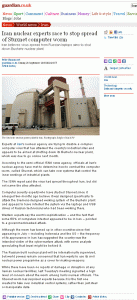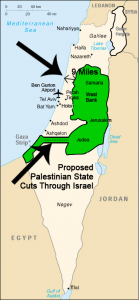Is peace possible without security? Netanyahu said last week, “security is the foundation of peace. Without it, peace will unravel. With it, peace can be stable and enduring.”
However, we recognize the “peace process” is fragile considering in the midst of the peace summit two terrorist attacks took place in Israel that left four people dead, including a pregnant woman along with another two who were injured in a separate incident.
Last week, the Western Media failed to report one of the main factors that allowed these terrorist attacks to take place — was the removal of checkpoints at the request of the Obama Administration.
George Mitchell, the U.S. Mideast peace envoy, specifically requested that Israel remove the checkpoints as a confidence-building gesture to restart talks with the PA. Over the past year and a half Israel removed at least 15 staffed checkpoints near Hebron where the first terrorist attack took place.
The checkpoints were put in place, not to prevent the movement of Palestinian people – but rather to prevent terrorist attacks like the ones that took place last week.
What would happen if the Palestinians ceased their acts of terrorism against Israel? The checkpoints would be removed, and they would be able to move freely in and out of Israel. I know what you’re thinking – Israel would never allow that to happen! Yeah. Right.
You’re probably asking yourself – how do you know? Okay, I’ll tell you. Well, I live in the Israeli city of Arad, which is about 20-minute drive west of the Dead Sea. Our little city is completely surrounded by Bedouin Muslims. I’ve never counted how many villages there are, but I venture to say at least 20 are within a half hour from where we live. Now let me ask you a question: How many security checkpoints do you think Israel has established to prevent terrorist attacks? If you guessed – NONE, you are correct! That’s right, there’s not a single checkpoint in any of these Muslim towns where their minarets (prayer towers) can be seen from miles away!
Why are there no checkpoints? These Muslims are not carrying out terrorist attacks! The media would love you to believe that Israel places these checkpoints in order to prevent the movement of Palestinians in the West Bank. But careful examination of the facts on the ground shows that Israel establishes checkpoints to PROTECT its citizens.
Israel doesn’t care if you’re a Muslim – however, Israel does care if you’re going to commit an act of terrorism against its citizens! So this is the reason why there are checkpoints in some areas and other areas are completely open without any restriction of movement.
Another fascinating aspect of the recent peace summit that wasn’t reported was the fact that Abbas wants those sitting in Israeli jails to be “freed”. Let’s take a look at what he said. I wrote on it in Worthy News last week:
“Palestinian leader Mahmoud Abbas said much has already been accomplished over the years and now was the time to address the “final status issues” of “Jerusalem, the settlements, the borders, security, water, and also releasing the detainees — in order to end the occupation that started 1967, the occupation of the Palestinian territories, and in order to create the state of Palestine that lives side by side with the state of Israel.”
Let me translate what the “releasing of detainees” means, since the Western Media failed to report it! Abbas wants the release of those who’ve been serving sentences in Israeli jails for carrying out terrorist attacks against innocent civilians in Israel!
Let’s look at what took place just before the peace summit last week. The Palestinian Authority honored Um Yousuf Abu Hamid, whose four sons are sitting in Israeli jails for carrying out terrorist attacks targeting Israeli civilians.
Palestinian Media Watch translated an Al-Hayat al-Jadida article in which the Palestinian Authority calls her a “central partner in the struggle, by virtue of what Hamid has given and continues to give.”
“It is she who gave birth to the fighters, and she deserves that we bow to her in salute and honor.”
So what did her sons do?
Nasser Abu Hamid: Seven life sentences plus 50 years for serving as the commander of Fatah’s military wing, the Al-Aqsa Martyrs’ Brigades, in Ramallah. Hamid was convicted of killing seven Israeli civilians and 12 attempted murders. His Brigades is responsible for scores of suicide bombings, shootings and civilian-targeting rocket attacks.
Nasr Abu Hamid: Five life sentences. He is a member of the terror faction of Fatah, Tanzim, and was convicted of involvement in two terror attacks and arms dealing.
Sharif Abu Hamid: Four life sentences. A member of one of the brothers’ units carrying out terror attacks against civilians and soldiers. He accompanied a suicide bomber to his attack in March 2002.
Muhammad Abu Hamid: Two life sentences plus 30 years for involvement in terror attacks.
Are these “detainees” the type of prisoners Israel should release out of their jails to “ensure” peace?
While we’re on the subject of security — what about Gaza? Can Mahmoud Abbas “guarantee” security in Gaza? In Gaza last week, Hamas called on the renewal of terrorist attacks, and called Abbas an illegitimate leader. Let’s face facts – Mahmoud Abbas’ term ended in 2009 – over a year ago! Nevertheless, he’s trying to bring peace to the region, so in the eyes of the world he will remain the “unelected” leader of the Palestinian people!
How can you bring security to a region when trust has been broken? You bring trust by backing your words with your actions. The PA, however, continues its incitement of violence towards the “Zionist enemy” on its airwaves and what it teaches in its schoolbooks.
If you want to bring peace to the region, you must change your words of hate and violence to those of peace; then back those words with actions — and I don’t see that happening any time soon!
Until next time…



